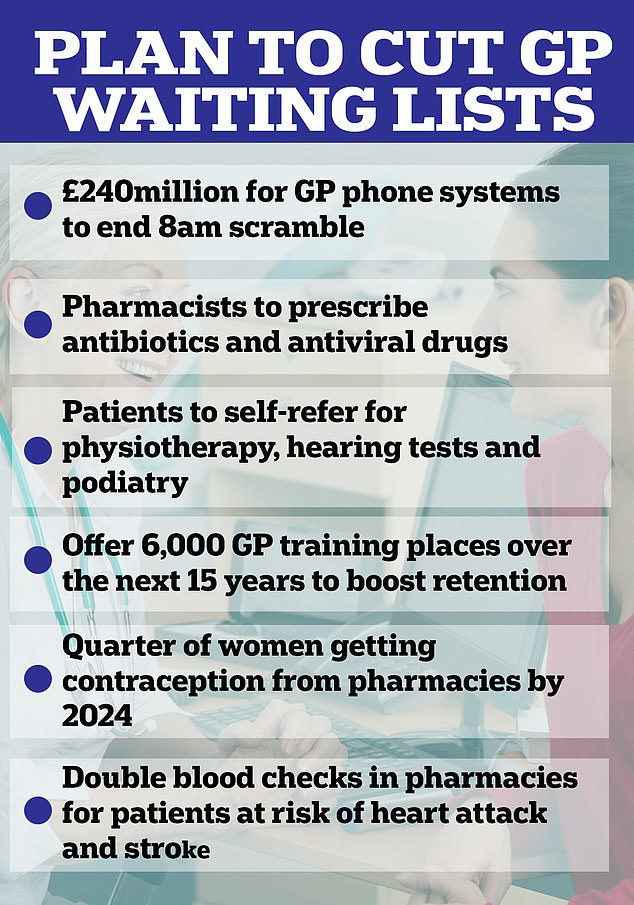Get the Pill at your pharmacy! New NHS plans to free up millions of GP appointments
Millions of women will be able to get free contraceptive pills on the high street without having to visit a GP, under new NHS plans.
From next month, women in England will be able to get a first prescription for the pill by visiting their local pharmacy.
The move will give women greater choice over where they can get the pill and forms a package of measures aimed at freeing up 10 million GP appointments by next winter.
If women choose the combined estrogen-progestin pill, they will be checked by a pharmacist to record their blood pressure and weight.
No checks are needed for the progestogen-only ‘mini-pill’, which is also the case in other settings, NHS England said.
From next month, women in England will be able to get a first prescription for the pill by visiting their local pharmacy. The move will give women greater choice over where they can get the pill and forms a package of measures aimed at freeing up 10 million GP appointments by next winter. If women choose the combined estrogen-progestin pill, they will be checked by a pharmacist to record their blood pressure and weight
Pharmacies must register for the new service, which means it will not be immediately available everywhere in England.
As more pharmacies join the scheme, the NHS website will be updated so women can check which locations offer the service.
Women who are overweight or have high blood pressure – which puts them at greater risk of blood clots when using the combined pill – can be referred to their GP for further checks.
Money has also been made available so that more pharmacies can offer repeat prescriptions for all types of pills.
The ongoing blood pressure and weight checks that women need when taking the pill will also be available in pharmacies.
NHS England said it expects almost half a million women will be able to access the pill next year without first contacting their GP, with this number set to rise.
Prescription figures for 2022/2023 show that there were almost 3 million prescriptions for the combination pill and more than 4 million for the minipill.
About one in four women between the ages of 15 and 49 use the combination pill or the progesterone-only pill.
Amanda Pritchard, chief executive of NHS England, said: ‘This is really good news for women.
‘We are all leading increasingly busy lives and this campaign means that instead of making a GP appointment, they can simply go to the local pharmacy if they need or want contraception.
‘We will also expand services so that more health checks are available to patients on the high street, which is not only better and more convenient for patients but also frees up NHS time for more GP appointments for those who need them most.’
Under wider plans, pharmacists will offer more blood pressure checks to at-risk patients, with a commitment to provide 2.5 million a year by spring 2025.
NHS England estimates this could prevent more than 1,350 heart attacks and strokes in the first year.
And from the beginning of next year, patients can also receive treatment for seven common conditions directly from the pharmacy, without the need for an appointment with the GP or a prescription.
The new service will focus on sinusitis, sore throat, earache, infected insect bites, impetigo, shingles and uncomplicated urinary tract infections in women.
New Health Secretary Victoria Atkins said: ‘It is a pleasure to start my time as Secretary of State with such a positive example of how the Government, the NHS and the pharmaceutical sector are working together to reach an agreement to improve services and save lives.
‘For the public, these changes will mean more options for women when making a choice about their preferred contraception, reduce the risk of people having a heart attack or stroke and make it easier to access medicines for common conditions.
‘And for healthcare professionals, this will free up GP visits and make better use of the skills and expertise within community pharmacies.’

As part of the measures unveiled in May, the government announced that a common pharmacy ailments program would be launched in England before the end of 2023. This service allows patients to obtain a prescription from their pharmacist for seven minor illnesses, including earaches and urinary tract disorders. infections without having to go to the doctor first. The plans also include an expansion of contraception and blood pressure monitoring services, both announced today
Janet Morrison, CEO of Community Pharmacy England, said: ‘It makes perfect sense to use community pharmacies as a first point of contact for healthcare advice, access to contraception and health checks such as blood pressure tests.
“Local pharmacies are staffed by highly qualified healthcare professionals and empowering them to do more is a logical next step for primary care.
‘These new services will help patients and the public, and reduce pressure on GPs and the wider NHS.’
William Pett, head of policy, public affairs and research at Healthwatch England, said: ‘Women across England will welcome the convenience of getting the contraceptive pill from a local pharmacy.
‘Being able to see your GP in a timely manner remains the public’s biggest concern.
‘If this initiative is communicated and implemented effectively, it will make a real difference to patients and ease pressure on stressed services.
‘There could be potential issues, such as pharmacists not being able to see enough of people’s GP data or the ability of different communities and areas to access the new service.
‘However, if it is properly evaluated, the NHS can ensure that this promising new service really works for patients.’
